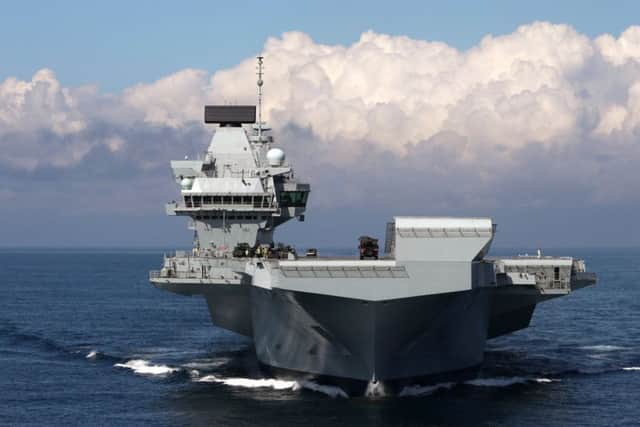Paris Gourtsoyannis: Four huge issues lost in Brexit's vast shadow
Quite a lot of it has been taken up by Brexit lately. In different circumstances, a lot more time and energy could be spent tackling some other big challenges facing the country and the world. Here are a few that might get more attention if it weren’t for the B-word, which will not appear again on this page:
Local government
Local government is picking up the bill for austerity. The Scottish Government has passed on cuts in its block grant to councils with interest, while in England, the impact has been even greater.


Advertisement
Hide AdAdvertisement
Hide AdFinancial pressures that have squeezed services are now being felt in bricks and mortar: a backlog of repairs threatens the People’s Palace and Winter Gardens in Glasgow, while in Edinburgh, the council could close all but two public toilets.
Growing social deprivation and falling council tax receipts have led to calls for local authority amalgamations in Glasgow and across Scotland, while in England, one council has gone bust with warnings that more could follow.
This should be the level of government closest to the public, where people’s voices are heard on issues affecting their daily lives, big and small: streets, bins, schools and housing.
There’s a crisis in local government but the only reform agenda to get any real attention – abolishing the council tax – has stalled. The danger of people feeling their elected officials have nothing to say to them has become clear, and local government should be central. Instead, it’s circling the drain.
Yemen
Yemen’s bloody civil war has long since become a humanitarian catastrophe. Aid workers say the conflict has broken a taboo set by the 1983-85 Ethiopian famine, whose images are etched in popular memory. There wasn’t supposed to be another catastrophe on that scale, when nearly half a million people died of hunger, shaming the wealthy countries of the world into action.
But the pictures emerging from Yemen are as bad as 30 years ago. Save the Children believes 50,000 children died of hunger last year. UNICEF puts the death rate at 130 children a day – one every ten minutes.
But while the famine in Ethiopia sparked a humanitarian response that became a cultural milestone, there’s no such reaction to the crisis in Yemen. Violence stops journalists from reporting and aid from being landed.
A key player in the conflict is Saudi Arabia, which has been accused of numerous violations of international law in its air campaign on behalf of the Yemeni government, including a bomb attack that destroyed a school bus in August, killing 40 boys and dozens of adults. Despite calls for an arms embargo, the value of UK arms sales to Saudi Arabia actually grew by two thirds in 2017, from £679 million to £1.13 billion.
Defence
Advertisement
Hide AdAdvertisement
Hide AdHMS Queen Elizabeth has been in the news as much as Strictly Come Dancing over the past few weeks, from the arrival of the first F35 fighter aircraft on the aircraft carrier’s deck to dramatic pictures of its arrival in New York harbour, framed by the Manhattan skyline.
The Ministry of Defence will be thrilled at media coverage that distracts from less welcome headlines. Serious problems in defence procurement and recruitment threaten to undermine the UK’s military capabilities.
The National Audit Office revealed earlier this year that the black hole in the budget for new military kit could exceed £20bn. And despite plans to shrink the army to 82,000 full-time troops, the outsourcing company hired to manage a recruitment drive hasn’t hit its target since 2015. Army chiefs are now short by 5,000 soldiers, and Capita could be sacked from the contract.
Meanwhile, even as the UK parades its new aircraft carriers and commits to a generation of shipbuilding work on the Clyde, it could still have fewer than 25 frigates and destroyers by the end of the next decade, raising questions about whether the Royal Navy can assemble a task force to protect Queen Elizabeth in hostile waters without the help of allies. The UK’s six new Type 45 destroyers are spending less and less time at sea due to manpower issues and expensive refits to correct engine faults.
Again, the Ministry of Defence will point to good news on shipbuilding, with the export of the Type 26 frigate design – but the fact that Canada is buying 15 vessels and Australia nine merely underlines how stretched the Royal Navy, which will get just eight, really is.
Taxation
Earlier this month, it emerged that Facebook paid just £15.8m in UK corporation tax last year despite making record sales worth £1.3bn in this country. The social media giant slashed its British tax bill by declaring £444m in “administrative expenses”, while reporting a global profit of £15.3bn. Facebook isn’t the only web giant banking profits outside the UK: last year Amazon paid £4.5m in UK tax on sales of £8.7bn; Google paid £49.3m on sales of £5.7bn; Apple paid just £10m on sales of £1.2bn.
Forcing internet money-making machines to pay tax where they do business requires multinational co-operation. Chancellor Philip Hammond is expected to outline a unilateral “digital services tax” when he delivers the Budget next week, but it’s only when their biggest markets agree to enforce the same rules that web giants are cut down to size.
Hiring former deputy prime minister Nick Clegg as its chief spinner is the latest sign that Facebook believes Brussels is setting the pace on the issue. Work to extract a fair share of tax for the UK won’t be helped by ... upcoming events.
